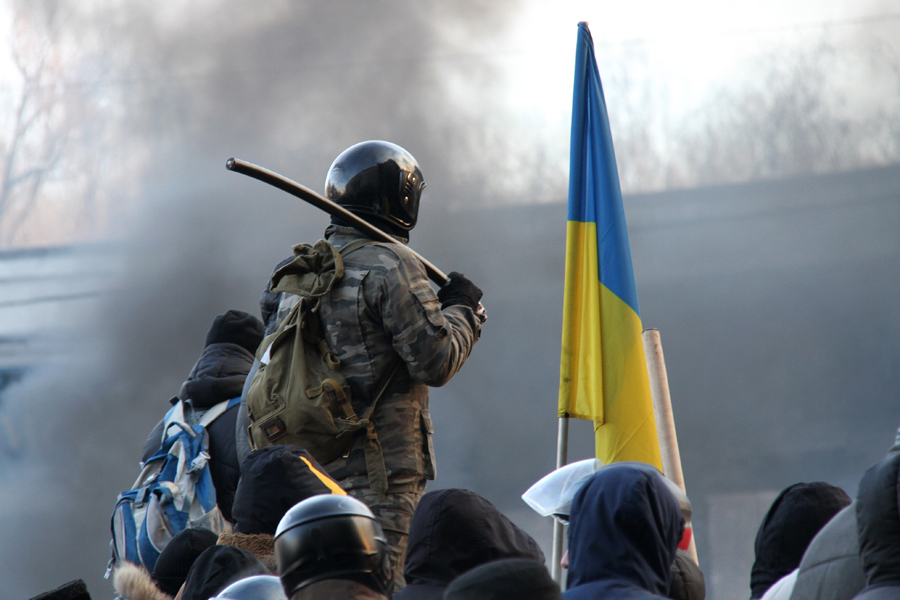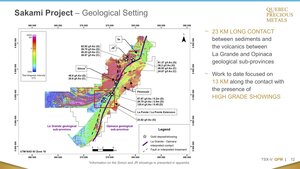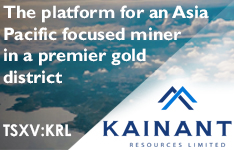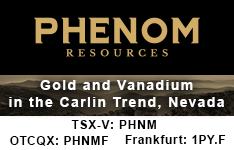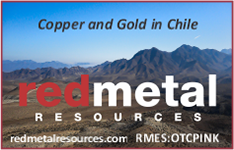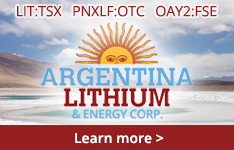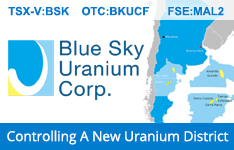Commodity and stock futures have maximum allowable limits for price appreciation or deprecation. It is an attempt to avoid catastrophic blowups to investors who are on the wrong side of the trade.
Only under the most volatile of market conditions do we ever see "melt-up" or “meltdown” scenarios. We are seeing these scenarios in real time right now.
Commodity prices are soaring as tensions between superpowers escalate because of the Russia vs. Ukraine situation, setting up the U.S. dollar to continue to dominate the world as a reserve currency.
Where is the true safe haven? You aren’t seeing people rush to rubles, yen, or euros. They are rushing into the dollar and gold, both of which have appreciated sharply since the conflict began.
This is a world I’ve described many times before where we can have both a strong US dollar and strong gold prices.
Gold has spiked higher up close to $250 over the last two weeks and has hit as high as $2,067 per ounce. We are paying close attention, and have loaded up on the best gold stocks in Katusa’s Resource Opportunities portfolio.
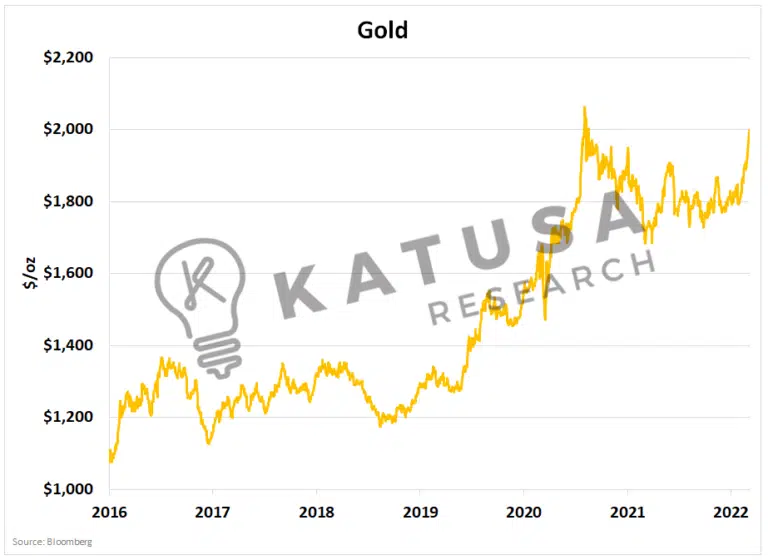
Global Energy Prices Soar
Oil has ripped nearly 60% higher this year. Brent crude, which is a key European benchmark oil price, has now taken out most of its previous resistances.
It is within striking distance of its all-time high set back in August 2008.
It's soaring right now because Russia is one of the world’s largest oil producers and exporters. If Russian companies are for the vast majority shut out of swift banking facilities, it effectively reduces to zero any oil that would normally be routed to western countries.
This represents millions of barrels of oil in an already tight market.
The U.S. has banned all oil, natural gas, and coal coming from Russia. President Joe Biden has urged all other nations to do the same but acknowledges that many cannot do so (like Germany) without some time to secure alternative sources.
Uranium was not included in the import ban.
I know this will sound absurd, but the U.S. has already given sanction waivers to Rosatom (Russia’s largest uranium company, which owns Uranium One).
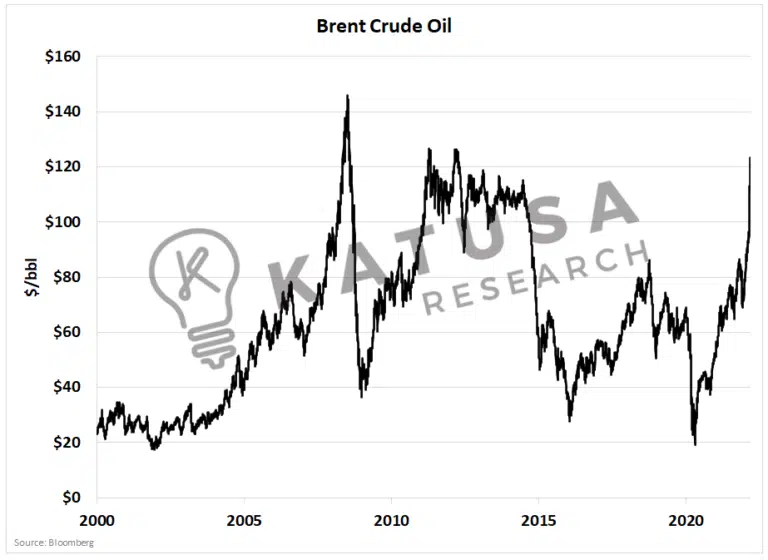
The Big Wild Card
Elsewhere in the energy market, uranium has caught a bid. It broke $50 per pound for the first time since 2012. As I have written about many times, the former Soviet Union produces half the world’s uranium.
As utility companies look to avoid doing business with Russia, this is going to spike spot prices.
Just like with avoiding Russian oil, new uranium can’t just be created out of thin air and this has and will continue to spike prices. This is the big wild card. Nations will start voluntarily rejecting Russian nuclear fuel, the way Sweden has.
Sweden only has six operating reactors, but that alone has taken the spot price from $43 to $47 in three days. More nations will be pressured by their citizens to follow Sweden’s lead of voluntarily avoiding Russian uranium and commodities. This will have upward price pressure on the uranium spot and long-term price.
One would think that if Russia continues its advance and increases its land grab, the energy flow would be a sacrifice that the European Union would have to make once it secures alternative sources (which could take as long as a year).
Keep an eye on uranium as the mainstream narrative continues to shift towards this carbon-neutral fuel.
Bullish For Carbon Credits
Because the flow of Russian natural gas could be slowed significantly, the switch to coal (to make up for the difference) will replace natural gas for electricity generation.
Coal emits much more carbon dioxide than natural gas, meaning the utilities will have to offset those emissions. The transition to green and non-Russian fossil fuels is years away.
We are very early to the carbon bull market. If you want to follow carbon prices and breaking news, this is a free resource with live price feeds.
Metals Markets Rip Higher
We are seeing this in the nickel market in an even more aggressive fashion. Russia is one of the largest nickel producers and on the fear of not being able to ship products, prices are soaring. In the most extreme move in nickel's history, prices soared 90%, leading to the largest per-dollar gain ever.
This is going to have massive ripple effects on the steel industry, which utilizes 70% of the world’s nickel production every year.
Elon Musk and company won’t be happy either as nickel is a core ingredient in many of the EV batteries built today.
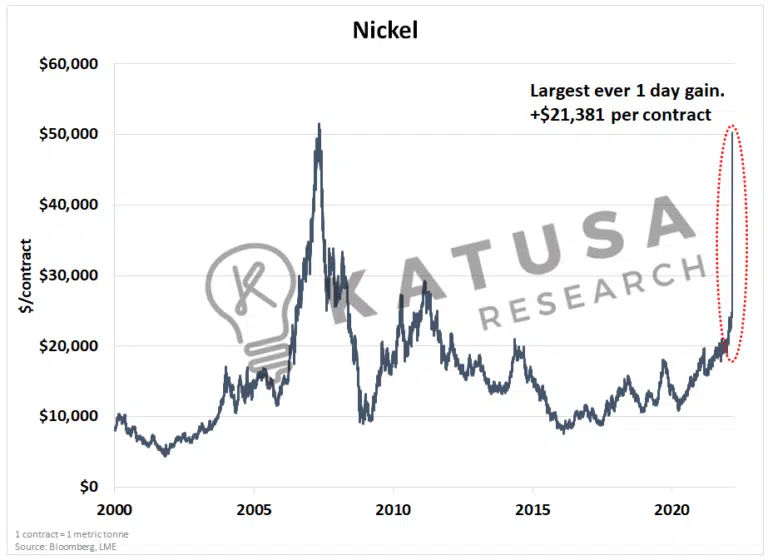
Right in the Breadbasket
Even local markets are feeling the effects of the conflict. Wheat traded in Chicago's Mercantile Exchange is up 70% and has gone "limit up" in six straight sessions.
Last week alone, wheat prices surged over 40%.
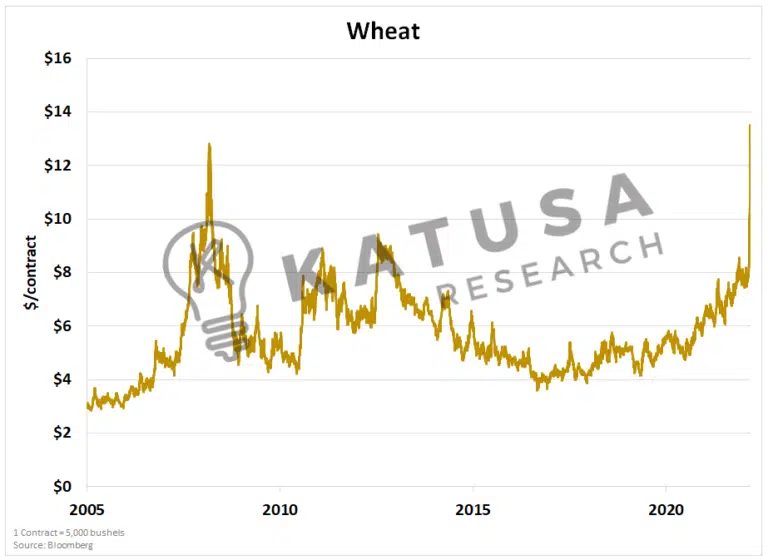
Wheat is just one of many “soft commodities” which are being bid up aggressively.
Russia and Ukraine are large suppliers of grains, vegetables, and fertilizers. Food prices around the world are already high and are likely heading even higher.
As food prices go higher and GDP growth slows due to this conflict, stagflationary concerns in Europe seem to be a scenario that is worth preparing for.
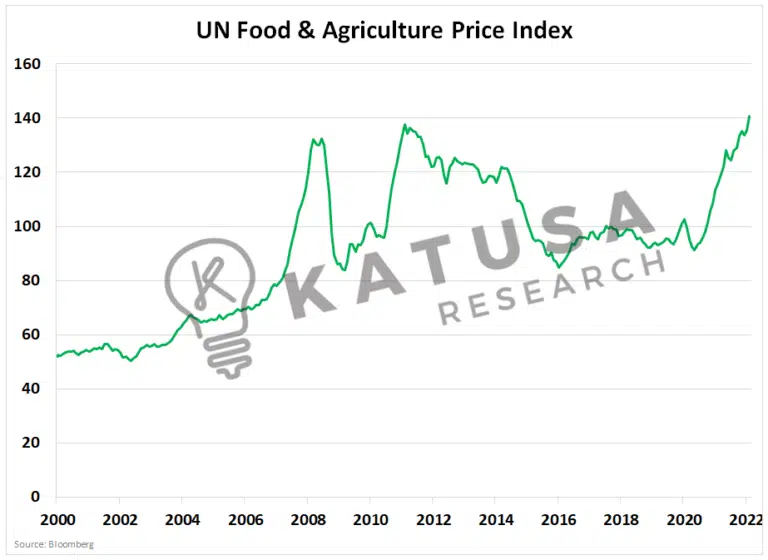
The Colder War
The number of mining companies in the S&P 500 will increase, which means an increase in the flow of capital into the sector. At the end of the Cold War, there were 20 mining companies in the S&P 500. Today there are two.
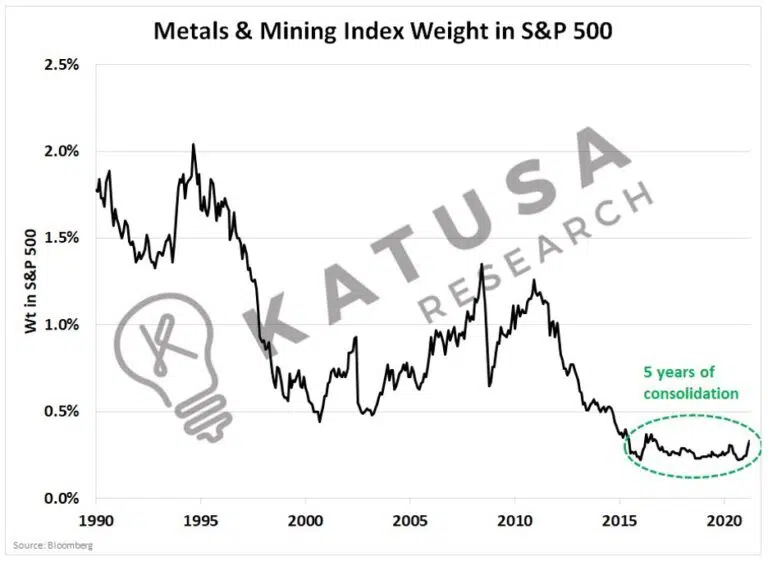
Expect this to change with The Colder War.
We are amidst truly ugly and challenging times. Russia appears to be committed and tensions are going to continue to escalate.
I play the cards I’m dealt, and there will be many generational opportunities in the coming months — if you have cash ready to put to work. You can follow along to see exactly what I’m doing, and what positions I hold. It’s all within the pages of Katusa’s Resource Opportunities.
Fortune favors the bold. Don’t get scared now.
Marin Katusa is the author of the New York Times bestseller, "The Colder War." Over the last decade, he has become one of the most successful portfolio managers in the resource sector, such as his 2009 Fund Partnership (KC50 Fund, LLC) which has outperformed the comparable index, the TSX.V by over 500% post fees. Katusa has been involved in raising over $1 billion in financing for resource companies. He has visited over 400 resource projects in over 100 countries. Katusa publishes his thoughts and research at www.katusaresearch.com.
Disclosures:
1) Marina Katusa's disclosures are below.
2) The following companies mentioned in this article are billboard sponsors of Streetwise Reports: None. Click here for important disclosures about sponsor fees. The information provided above is for informational purposes only and is not a recommendation to buy or sell any security.
3) The article does not constitute investment advice. Each reader is encouraged to consult with his or her individual financial professional and any action a reader takes as a result of information presented here is his or her own responsibility. By opening this page, each reader accepts and agrees to Streetwise Reports' terms of use and full legal disclaimer. This article is not a solicitation for investment. Streetwise Reports does not render general or specific investment advice and the information on Streetwise Reports should not be considered a recommendation to buy or sell any security. Streetwise Reports does not endorse or recommend the business, products, services or securities of any company mentioned on Streetwise Reports.
4) From time to time, Streetwise Reports LLC and its directors, officers, employees or members of their families, as well as persons interviewed for articles and interviews on the site, may have a long or short position in securities mentioned. Directors, officers, employees or members of their immediate families are prohibited from making purchases and/or sales of those securities in the open market or otherwise from the time of the decision to publish an article until three business days after the publication of the article. The foregoing prohibition does not apply to articles that in substance only restate previously published company releases.
Marin Katusa's Disclosures:
Please assume Marin Katusa, Katusa Research and its employees have a financial interest in all companies and sectors mentioned. The information provided is for informational purposes only and is not a recommendation to buy or sell any security. This is not financial advice.


